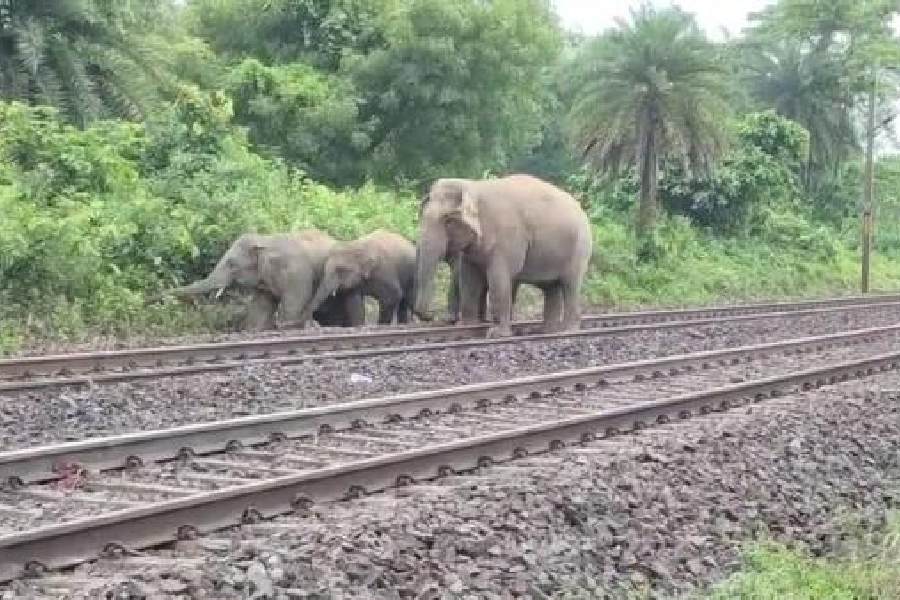Three elephants, a mother and two calves, were crushed by an express train moving at over 100kmph in a pocket of Jhargram early on Friday.
The accident happened just before 1am as the Jan Shatabdi Express was headed to Howrah from Barbil in Odisha. The elephants were part of a larger herd crossing the tracks between Jhargram and Banshtala stations, said a forest official.
“The mother would have survived had she been alone. It was probably moving slowly to make sure her calves were safe,” he said.
Train services between Howrah and Kharagpur were disrupted for over five hours after the accident. The bodies were cleared by a crane around 6am.
Elephant deaths on railway tracks are not uncommon in north Bengal, particularly on the link between Siliguri and Alipurduar. In south Bengal, Friday’s deaths are the first such since 2018, when a speeding Howrah-Mumbai Jnaneswari Express killed three elephants in the same district.
The deaths have triggered a blame game between the state forest department and the railways. But ecologists and animal lovers pointed to other malaises such as uncontrolled hula parties and lack of resources to engage sophisticated technology, like real-time, early-warning systems, in the elephant corridors of south Bengal.
Such sensors are already in use in some areas of north Bengal.
Birbaha Hansda, the state forest minister, told this newspaper: “Despite being
informed about the location of a herd of elephants near the tracks, the railway authorities did not take any proactive measures, particularly restricting the speed of the train”.
“There is a WhatsApp group that includes both forest and railway officials, where the forest department regularly updates the location of elephant herds near railway tracks. Around 11pm on Thursday, a forest officer in Jhargram had posted a caution in the group, requesting speed restrictions for trains passing through Jhargram and Banshtala railway stations. However, the Jan Shatabdi Express was travelling at high speed,” added Hansda.
Umar Imam, the Divisional Forest Officer of Jhargram, said: “We lost three elephants. We have initiated a probe under the relevant forest laws. We will identify those responsible for this tragedy and ensure proper legal action is taken”.
Forest sources said the inquiry will also probe the alleged negligence of railway officials. A case has already been filed at Jhargram court, they said.
An official of South Eastern Railway, which operates the Jan Shatabdi and other trains linking Bengal with other eastern and southern states, acknowledged that a message had come on WhatsApp.
“The usual norm is to send a written memo to the nearest station master,” he said. Asked what if that is not possible in an emergency, the official said: “The deaths could have been avoided had someone (from the forest department) made a phone call (to someone in the railways)”.
A WhatsApp text is accepted as an official communication, a forest officer said.
K.R. Chaudhary, the divisional railway manager of Kharagpur division, said an inquiry had been launched on behalf of the railways as well. “Action will be taken if anyone is found to have been negligent,” he said.
The train was moving at a speed of over 100kmph, said an official.
This is the second time in less than a year that the elephants have fallen to man-wild conflict in Jhargram.
In August last year, one of five elephants that strayed into Jhargram town was killed after being speared by a burning iron rod, apparently by a member of a hula party comprising residents armed with searchlights, flaming torches and crackers and deployed to steer jumbos away from human settlements. The elephant, later darted with a sleep gun, was brought to the Jhargram zoo for treatment, but it did not survive.
Animal lovers have long been alleging that the hula parties are unregulated and employ indiscriminate and dangerous measures to drive elephants away. The use of hula parties is already under the scrutiny of the Supreme Court.
Animal activists linked the deaths to hula parties this time as well.
They requested anonymity but shared with this newspaper screenshots of WhatsApp messages in quick-response teams that suggest that hula parties were in action in and around the area on Thursday night.
Some of them have made similar allegations on social media as well.
Forest officials denied the involvement of any party.
Sandeep Sundriyal, the chief wildlife warden of Bengal, told this newspaper: “We have already started a probe. The thrust is also on strengthening the communication and coordination between the forest department and the railways.”











